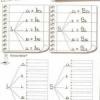
see or come, which verb to use?
To see, verb in the nominal form of the infinitive, means to observe, to look, to see. About that, come over designates going to a place, moving around, heading.
see more
Portuguese mistakes: 11 words often pronounced wrongly…
WiFi, wifi or wifi? See how to write the term correctly
There are great difficulties and mistakes when using the verbs ver and vir, because in addition to having similar spellings, in some ways the conjugations are as well.
The conflict centers on the fact that the future subjunctive of “ver” being the verb “vir”, considering that it is a verb irregular.
Thus, when applying the phrase “if I see her” the reference is made to the verb to see in the intention of saying “if I find her”, but in the tense of the future subjunctive.
The correct answer would then be “If I see her today, let me know you want to visit her”, instead of “If I see her today, let me know you want to visit her”.
Attention! Do not forget that the future of the subjective to see é come over, and that of come over é come.
It is important to highlight that the subjunctive is a verbal mood whose purpose is to express doubt or uncertainty in the face of an action.
Just watch! The imperfect subjunctive tense begins with the use of the conjunction “se”, to induce a hypothesis, being characterized by the ending “sse”. Examples are:
In the future tense of the subjunctive, the sentence is written using the conjunctions “when” or “if”, aiming to indicate a possibility. In addition, it has the endings “ar”, “er” and “ir”.
Maybe this could also help you:


